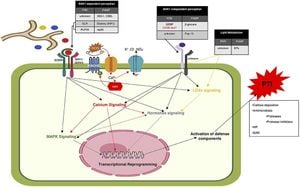The release of former American diplomat Mark Fogel from Russia marks a notable event amid the complex backdrop of U.S.-Russia relations. Fogel, who was arrested at Sheremetyevo Airport in August 2021 on drug smuggling charges, has now returned to the United States following negotiations led by Steve Witkoff, the U.S. special envoy to the Middle East.
According to the White House, Fogel's release was confirmation of positive dialogue between the two nations, with U.S. National Security Advisor Mike Waltz stating, "This exchange reflects goodwill from the Russian side and is a good sign toward the end of the war in Ukraine." The details surrounding the arrangement remain somewhat murky, as it hasn't been disclosed whether any Russian prisoners were released as part of this exchange.
Mark Fogel's troubles began on August 15, 2021, when he was detained at Moscow's Sheremetyevo Airport. Upon inspection, customs officials discovered marijuana and hashish oil in his suitcase—substances Fogel claimed were for personal use as directed by his doctor due to back surgery he had underwent. Despite his claims of using the drugs for medical reasons, the Russian authorities charged him with drug trafficking, resulting in his conviction by the Khimki City Court, which sentenced him to 14 years, labeling it as serious drug offenses under Russian law.
Fast forward to February 2024: Fogel's family received the long-awaited news of his release. The family's statement expressed their overwhelming relief and gratitude, reflecting on the emotional whirlwind of more than three years without their loved one. They noted, "We are extremely thankful, feeling both relief and shock at the fact our husband, father, and son, Mark Fogel, is finally coming home."
While his release is seen as largely positive, the circumstances of his case highlight the often precarious nature of American citizens abroad, particularly when faced with legal discrepancies involving drug laws, which can vary significantly between countries. This serves as yet another reminder of the different treatments of legal substances internationally.
The diplomatic maneuvering around Fogel’s release has garnered interest from various commentators, including Steven Kapus, president of Radio Free Europe/Radio Liberty, who hailed the development as "fantastic news!" Kapus acknowledged the challenges of diplomacy intertwined with individual narratives like Fogel's.
Witkoff's arrival to Moscow had been shrouded with speculation, particularly over the use of a Gulfstream G650ER private jet. While the Kremlin initially denied knowing about his arrival, it eventually became clear Witkoff had been instrumental in securing Fogel's release. The White House’s announcement emphasized the negotiations served as acknowledgment of goodwill by Russia, which Waltz noted could be pivotal during tense moments, especially relating to Ukraine.
Fogel’s case was not isolated; it mirrored broader conversations about mutual interests and humanitarian concerns amid rising geopolitical tensions. Notably, the timing of this exchange coincided with international discussions leading up to significant meetings on Ukraine’s conflict, which adds another layer of complexity to Fogel's release.
Despite the joyous news for Fogel's family and supporters, many questions remain unanswered. Speculation abounds about who or what would replace Fogel for the Russian side and why there has been such a sudden push for exchanging detained individuals at this juncture.
Fogel, prior to his incarceration, was known as both a teacher at the Anglo-American School of Moscow and as part of the U.S. embassy staff. He previously held diplomatic status until mid-2021 when his role transitioned from ambassadorial support to teaching leadership. This change, combined with his legal predicament, painted Fogel as another casualty caught between national interests.
While diplomatic discussions continue, Fogel's release has become emblematic of the tensions between personal justice and international relations. The impact of his story resonates not only with his immediate relatives but also anyone observing the fluid interactions between the U.S. and Russia. Fogel's sense of relief at returning to his home country must balance against the broader realities of many who find themselves similarly ensnared abroad.
With the complexity of drug laws being highlighted, it remains to be seen how this exchange will influence future detainee negotiations. It serves as another chapter of nuance within the relationship between the U.S. and Russia, encapsulating the challenges, hopes, and uncertainties of those who navigate the waters of international diplomacy.



